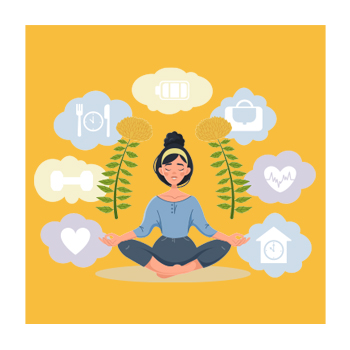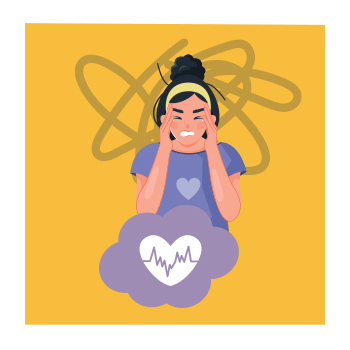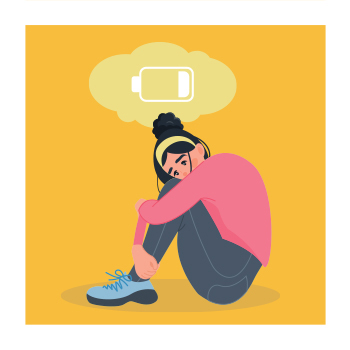


Sign-up for {N}power to get exclusive discounts, newsletters, members-only features, and more!

Stressed out? Hit a wall? Mood tanked? Stamina long gone? If you’ve reached the point where you feel like you can’t take on one more task, face one more problem, or just can’t take another punch, punch back with the power of rhodiola, the little plant with big benefits. Rhodiola rosea is a perennial herb native to high-altitude areas in Europe, Central Asia, Siberia, and North America and is known as an adaptogen.1 Much like its ability to adapt to and thrive in conditions that are less than ideal, rhodiola can also help our bodies adapt to physical and psychological stressors, as well as buffer the effects of burnout and exhaustion.2 3 It can also have a positive effect on mood. When life packs a punch—rholl with the punches with rhodiola.
 Think of rhodiola as bringing calm to the chaos by helping to promote a healthy stress response. It does this so well that the European Medicines Agency (Europe’s version of our FDA) approved Rhodiola rosea for use as an adaptogen for the temporary relief of symptoms associated with stress, such as fatigue, exhaustion, and a general sensation of weakness, based on its long use in traditional medicine and numerous scientific studies.4
Think of rhodiola as bringing calm to the chaos by helping to promote a healthy stress response. It does this so well that the European Medicines Agency (Europe’s version of our FDA) approved Rhodiola rosea for use as an adaptogen for the temporary relief of symptoms associated with stress, such as fatigue, exhaustion, and a general sensation of weakness, based on its long use in traditional medicine and numerous scientific studies.4
The adaptogenic compounds in rhodiola help the body adapt to stress by decreasing or preventing hormonal changes related to prolonged stress, including having the ability to balance the stress hormone cortisol.5 6 Chronically elevated cortisol levels may contribute to accelerated signs of aging, higher levels of psychosocial stress, poorer cognitive performance, atrophy of memory-related structures of the brain, weight gain, and exhaustion.7
In one study, when 200 mg of rhodiola was taken twice daily for four weeks by stressed-out subjects, results showed that it alleviated their stress to a “clinically relevant degree”—with some seeing results and improvements after just three days. Improvements in stress symptoms continued to be observed after just one week and upon completion of the four-week study.8 9
Physicians working night shifts also benefited from rhodiola supplementation, according to the findings of another study. The subjects—56 male and female physicians—were given tests to determine the effect that working late nights had on overall fatigue, short-term memory, ability to concentrate, and speed of audio-visual perception. The result of the two-week, double-blind study showed that daily supplementation with 170 mg of a standardized rhodiola extract helped with mental weariness, improved performance on work-related tasks by 20 percent, and led to a significant improvement in fatigue scores.10 11
 Rhodiola has been widely used to improve cognition and mental performance in cultures across the globe.12 In fact, in Traditional Chinese Medicine (TCM), rhodiola and its constituents are used to replenish qi (vital energy), activate blood circulation, unblock blood vessels, and enhance mental function.13 In Europe, rhodiola is also defined by the European Food Safety Authority as something that “contributes to optimal mental and cognitive activity.”14
Rhodiola has been widely used to improve cognition and mental performance in cultures across the globe.12 In fact, in Traditional Chinese Medicine (TCM), rhodiola and its constituents are used to replenish qi (vital energy), activate blood circulation, unblock blood vessels, and enhance mental function.13 In Europe, rhodiola is also defined by the European Food Safety Authority as something that “contributes to optimal mental and cognitive activity.”14
Putting it to the test, so to speak, a group of 50 adults were treated with 200 mg of rhodiola extract two times a day for 12 weeks and subjected to neuropsychological tests prior to supplementation, after six weeks, and after 12 weeks of supplementation. When it came to reaction times, attention tasks, dual tasks, and divided attention tasks, all subjects improved after taking rhodiola. The findings concluded, “The results of this pilot study show an improvement of mental speed and moreover, suggest improved mental resources.”15 16
Furthermore, animal models have shown that compared to a control, rhodiola has a positive effect on learning and memory, largely through its antioxidant and anti-inflammatory effects, as well as its ability to improve coronary blood flow and cerebral [brain] energy metabolism.17
 Rhodiola is also a natural approach to help combat depression—it is often recommended by functional medicine doctors as an effective natural alternative to antidepressant medications.18 In one placebo-controlled study of 128 mild to moderately depressed patients, 150 mg of rhodiola daily was associated with “significantly improved depression” in about 66 percent of the patients compared to the placebo group. Rhodiola has also been found to be beneficial for depression related to perimenopause, with improvements in mood, energy, mental sharpness, and memory.19
Rhodiola is also a natural approach to help combat depression—it is often recommended by functional medicine doctors as an effective natural alternative to antidepressant medications.18 In one placebo-controlled study of 128 mild to moderately depressed patients, 150 mg of rhodiola daily was associated with “significantly improved depression” in about 66 percent of the patients compared to the placebo group. Rhodiola has also been found to be beneficial for depression related to perimenopause, with improvements in mood, energy, mental sharpness, and memory.19
Another study evaluated the impact of rhodiola extract on self-reported anxiety, stress, and other mood symptoms. Mildly anxious participants took 200 mg of rhodiola twice daily. After two weeks, the experimental group saw a significant reduction in anxiety, stress, anger, confusion, and depression, and improvements in total mood.20 Lastly, a separate study found that supplementing with 360 mg of rhodiola daily for 10 weeks led to significant improvement in symptoms of generalized anxiety disorder (GAD).21
 In May 2019, the World Health Organization (WHO) officially included burnout in its International Classification of Diseases.22 The WHO defines burnout syndrome as resulting from chronic stress characterized by feelings of exhaustion or energy depletion, negative or cynical feelings related to a job, and reduced professional efficacy.23 A survey from FlexJobs and Mental Health America reported that 75 percent of workers have experienced burnout.24 So, what can be done about it? While the Mayo Clinic recommends sleep and relaxation as treatment, rhodiola offers a targeted, synergistic approach.25
In May 2019, the World Health Organization (WHO) officially included burnout in its International Classification of Diseases.22 The WHO defines burnout syndrome as resulting from chronic stress characterized by feelings of exhaustion or energy depletion, negative or cynical feelings related to a job, and reduced professional efficacy.23 A survey from FlexJobs and Mental Health America reported that 75 percent of workers have experienced burnout.24 So, what can be done about it? While the Mayo Clinic recommends sleep and relaxation as treatment, rhodiola offers a targeted, synergistic approach.25
The first clinical trial exploring the outcomes specifically in burnout patients treated with rhodiola found that patients who took 200 mg twice daily for three months had improvements in all three main symptoms of burnout: exhaustion, cynicism, and lack of efficacy.26
Taking rhodiola for improving strength, stamina, and athletic performance has been around so long even the Vikings have been said to have used it to enhance endurance and physical strength!27 Now, modern research has shown that supplementation does have a positive effect on athletic ability and performance—without adverse effects.
According to one review of 10 published research papers on rhodiola and its ability to “improve human exercise ability,” results included: a reduction in pain and muscle damage after training, a reduction in oxidative stress, as well as an enhancement in antioxidant capacity, an increase in the body’s resistance to fatigue, and an improvement in athletic explosive power. The doses in the studies ranged between 170 mg/daily and 1,500 mg/daily.28 29
Furthermore, animal experiments have shown that rhodiola increases adenosine triphosphate (ATP)—what our cells use to produce energy—and creatine phosphate, which helps maintain a constant concentration of ATP in muscle cells during bursts of exercise that would otherwise deplete ATP from these cells.30 31 Rhodiola-treated rats significantly prolonged the duration of exhaustive swimming, and the supplement had the effect of activating the synthesis of ATP in mitochondria, while promoting the process of energy recovery in the body after exercise.32 33
From mental clarity and a boost in mood to stress resistance and increased endurance, rhodiola is there for it all.
 As we age, our immune function declines in a process called immune senescence, in which we lose the ability to mount a robust immune response to antigens and see an increase in low-grade inflammation, also called “inflammaging.” This, in turn, can make us more susceptible to developing autoimmune diseases and cancer.19 20 21 22 23
As we age, our immune function declines in a process called immune senescence, in which we lose the ability to mount a robust immune response to antigens and see an increase in low-grade inflammation, also called “inflammaging.” This, in turn, can make us more susceptible to developing autoimmune diseases and cancer.19 20 21 22 23
Animal studies have shown that rhodiola can enhance immune function, provide antiviral and antibacterial activities that can reduce the risk of serious infections, including influenza, and inhibit the growth of a variety of human cancer cell lines. 24 25



Sign-up for {N}power to get exclusive discounts, newsletters, members-only features, and more!